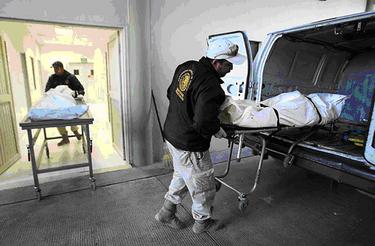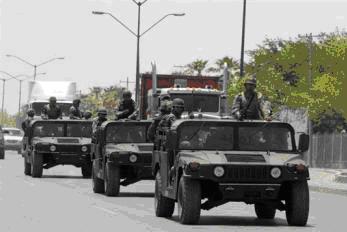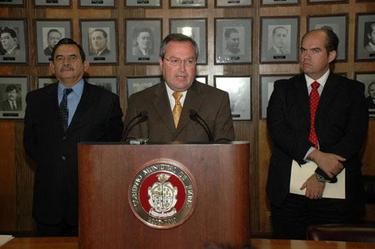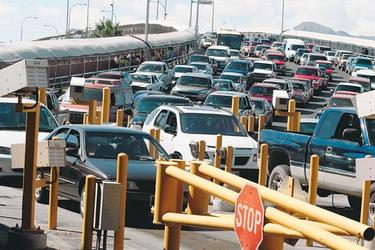
"FRONTLINES OF THE FRONTIER:" REAL SECURITY, FREE TRADE AND COMPREHENSIVE IMMIGRATION ON THE TEXAS BORDER
February 24, 2009
"For too long, we have watched money wasted on virtual immigrant hunts and paid patrols trying to trap immigrants. Now is the time for real security and a clear focus on the real threat—violent, international criminal gangs. Today, we ask the Texas DPS to organize around corridor teams—a proven approach coordinated with local, state and federal law enforcement to gather better intelligence, arrest key gang leaders and seize cash, weapons and property to deny drug cartels a base in our communities.”
Written by Senator Eliot Shapleigh, www.shapleigh.org
EL PASO - Today, Texas Governor Rick Perry hosted a press conference in El Paso on the issue of Texas' Border Security Strategy. Senator Eliot Shapleigh (D- El Paso) has released the following statement in reaction to the Governor's address:
"During his inaugural address, President Barack Obama said "America is a friend of each nation and every man, woman, and child who seeks a future of peace and dignity" and is "ready to lead once more.'' America can begin to show that leadership at home, right here on our southern border. More than ever, Mexico needs our help to strengthen its response to the devastating drug war that rages in the border region.
El Paso's sister city Ciudad Juarez has become a war zone. In 2008 alone, more than 1,600 people were murdered in cartel-related violence. In the first 31 days of this year, a record 153 more individuals were murdered, approximately five people a day. This month, 204 people were assassinated in only 22 days.
To put the death toll in context, in 2007, the bloodiest year of the Iraq war, 904 U.S. servicemen and women were killed. As in the war in Iraq, the violence in Juarez has spared no one.
"Extreme drug violence grips Mexico border city" - Los Angeles Times, Dec. 19, 2009
Click here to view larger image.
Mexican Army soldiers patrol the streets in Ciudad Juarez
Thousands of families have lost loved ones, schools have been shut down, and a generation of orphans is being created. Seventy-one officers from city, state and federal law enforcement agencies were killed in 2008.
In November, a journalist for Juarez' local newspaper who had covered the ongoing carnage was gun downed as he was leaving his home to drive his eight-year-old daughter to school. That same month, a headless body hung from an overpass. A burned, headless, handless body was dumped in front of the police station. In one day alone, 16 people were killed, including 7 executed next to a school. Mexico is not just fighting criminal activity; it is fighting for survival against narco-terrorism.
Proposed U.S. spending on the Merida Initiative to combat drug violence in Mexico is a drop in the bucket when compared to the reality on the ground. Thus far this year, 16 city, state, and federal law enforcement officers, including the chief of police have been murdered. In Juarez this past Friday, gunmen killed a police officer and a prison guard, and left a sign on their bodies saying that they would kill one officer every two days until the new city police chief resigns. He did so, late Friday. Following his resignation, several threats were left by cartel members on banners and posters throughout Juarez threatening Mayor Jose Reyes Ferriz, who had already moved his family to El Paso. President Obama and Homeland Security Secretary Janet Napolitano must act immediately to bolster Texas efforts to deter the escalating violence in Mexico.
Click here to view larger image.
Juarez Public Safety Secretary Roberto Orduna Cruz, left, resigned on Friday during a news conference with Juarez Mayor Jose Reyes Ferriz. At right is Juarez city official Guillermo Dowell. - El Paso Times, Feb. 21, 2009
In Texas, we must separate the issues of immigration reform, secure trade, and border security, and support a comprehensive approach to federal immigration reform that supports our national interests while protecting our national security. Separately, we must do much more to target the leaders of violent, transnational criminal gangs and their assets.
Thus far, efforts to combat the growing violence along the Border have been ineffective. The $2 million border surveillance system, a Web camera program, has only netted a handful of apprehensions in the first six months of its existence. The goal was to make 1,200 arrests in the first year of the project using tips from the online cameras. According to the latest report, only three arrests have been made. Likewise, of the 4,500 immigration violations they expected to report, only six have been made, and now the Border Sheriffs’ Coalition has announced the camera program will be dramatically scaled back.
Targeting crime-fighting funds to enhance border law enforcement without a specific purpose also has proven ineffective. In 2005, more than $5 million was given to an informal coalition of sheriffs, who split the money equally regardless of the share of crime in their jurisdiction. Presidio County, for example, received almost $350,000 to fight one crime in 2006. In contrast, Hidalgo County got the same amount to fight 7,160 crimes.
In 2006, El Paso County settled a civil rights lawsuit against the County Sheriff's department's use of Operation Linebacker funds to target people who look like immigrants. The lawsuit alleged that sheriff's deputies violated citizen's civil rights while illegally enforcing federal immigration laws. The suit also claimed the deputies violated Constitutional protections against unreasonable searches, seizures and detentions. The settlement required that El Paso County Sheriff to provide a clear written policy prohibiting deputies from enforcing federal immigration laws and to train sheriff's deputies on the limits of their authority to enforce those laws.
Funds to fight narco-terrorism should follow the drug cartels, which operate along trade corridors. The real threat to these illicit organizations comes from the arrest of key leaders and the loss of their products or proceeds through law enforcement seizure or internal theft. This is one of the reasons that drug cartels have always tried to minimize these risks through compartmentalization, corruption, and brutality.
In the 1980s, the FBI and New York City together deployed a successful model to fight transnational gangs operating from Sicily to Brooklyn through coordinated, targeted, police work aimed at kingpins. Here in Texas, we should adopt a similar multi-agency, multi-level cooperative model. The Department of Pubic Safety, in partnership with federal and local law enforcement, should deploy a coordinated strategy aimed at arresting key cartel leaders and forcing the forfeit of properties, cash and weapons of cartel operations along the corridors of drugs, human trafficking and prostitution.
While achieving adequate security is a central issue along the Border, security policies should not include highly fortified barriers that impede economic growth along the U.S.-Mexico border or the legitimate flow of commerce and people across the border. To date, however, the post 9/11 debate has focused too much on fences and the exclusion of undocumented people, and too little on creating policies that foster prosperity, mobility and secure trade to enhance economic growth not only in America but in the Americas.
Of the $332 billion in trade last year between the United States and Mexico, more than 80 percent entered Texas ports-of-entry by truck. Mexico is our country's second-largest trading partner, and Texas' largest trading partner. Texas’ exports to Mexico far exceed all trade with the European Union countries combined. In fact, we are doing just under a billion dollars of trade with Mexico daily. El Paso, with its four international bridges, is the second largest importer/exporter along the U.S.-Mexico border, after Laredo, Texas, accounting for nearly $47 billion in trade last year. These imports and exports account for approximately 6 percent of the entire U.S. economy.
Despite the importance of trade with Mexico, massive and increasing congestion at U.S.-Mexico ports-of-entry is threatening the local economies of the border and affecting trade throughout the United States. A crossing that used to take 30 minutes now takes up to three hours. Increased wait times translate into fewer pedestrian and commercial crossings. This in turn leads to congestion, dangerous pollution, higher costs of products, services, and transportation, and less tax revenue for border states. Combined, these problems undermine our nation's competitiveness in a world of "just-in-time" manufacturing.
Click here to view larger image.
Bridge waits frustrate - El Paso Times – October 2, 2007
Increased wait times are not due to increased volume; to the contrary, the volume of goods moving across the border has decreased. Rather, U.S. Border agents have stepped up their scrutiny of Americans returning home from Mexico, slowing commerce and creating delays at our ports-of-entry that have not been experienced since the months following the 9/11 attacks.
Our governments—state, local, and federal—need to value mobility as much as safety, commerce as much as security, and prosperity as much as enforcement. Letting fear of criminal gangs paralyze the flow of commerce across our Southern border rewards the wrong side.
Texas must lead the way in ensuring the safe, fast, and secure movement of people and products in a post- 9/11 world. Our border ports-of-entry need one-stop inspection facilities, adequate staffing, modern infrastructure, effective enforcement, and state-of-the-art pre-clearance technology to identify and cross safe goods and secure travelers, while detaining high-risk targets.
Finally, we must support fair and comprehensive immigration reform, both to protect our economic interests and enhance our national security.
History has shown that anti-immigration sentiment almost always follows a threat to national security. In the 1850s, the Know Nothing movement gained momentum in response to Protestants' fears of the new wave of Irish and German Catholics. The Know Nothings sought to not only severely restrict immigration from Catholic countries, but to also prohibit non-Protestants from holding political office or teaching public school. Soon after the beginning of World War II, Franklin D. Roosevelt signed Executive Order 9066, which resulted in the forcible internment of 120,000 Japanese nationals and Japanese Americans in ten camps around the country. During the Iranian hostage crisis of 1980-81, President Carter ordered all Iranian students in the Untied States to report to INS offices and show the lawfulness of their presence in the country. In January 1991, the Attorney General mandated the photographing and fingerprinting of virtually all non-immigrants bearing Iraqi and Kuwaiti travel documents before they were allowed enter the country.
Today, the events of 9/11 have precipitated another wave of anti-immigrant policy which is inhibiting the implementation of effective and efficient policies to secure our Borders from terrorist threats. For example, even though none of the 9/11 terrorists arrived in the United States through Mexico, the focus of immigration enforcement over the past several years has been on our southwestern border.
It is imperative that we separate the issues of Border security from immigration and secure, free trade. For example, more than 70,000 federal immigration cases clogged the courts in fiscal 2008, more than double the number of cases from the previous year. Meanwhile, the threats posed by gun trafficking, public corruption and organized drug cartel crime have been abandoned by U.S. attorneys and left in the hands of state and county officials who lack the resources and the authority to effectively prosecute them.
Now is the time to show that our nation is ready to lead once more. As John F. Kennedy once expressed, 'Geography has made us neighbors. History has made us friends. Economics has made us partners, and necessity has made us allies.'
During this legislative session, our state should:
- Articulate clear support for more resources, aviation assets and training to President Calderón's independent federal police force through the Mérida Initiative;
- Create DPS corridor teams to work with local and federal law enforcement to combat cartels;
- Develop a quality DPS intelligence center to evaluate and collect better intelligence on kingpins, cartel assets, prison gang members and routes;
- Enact new RICO, forfeiture and arrest statutes to give DPS and the Attorney General needed tools to combat cartels; and
- Redirect resources wasted on virtual cameras, and 287 (g) efforts to the real threat of international drug cartels."



